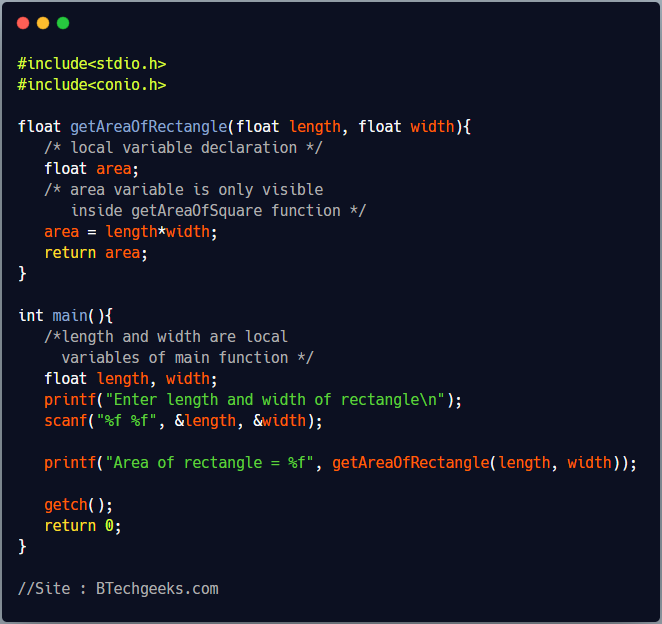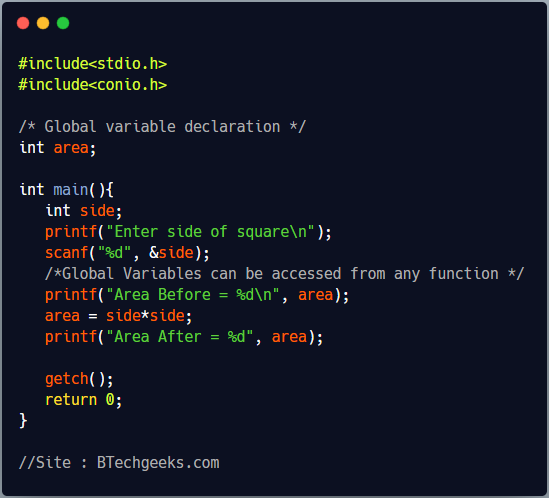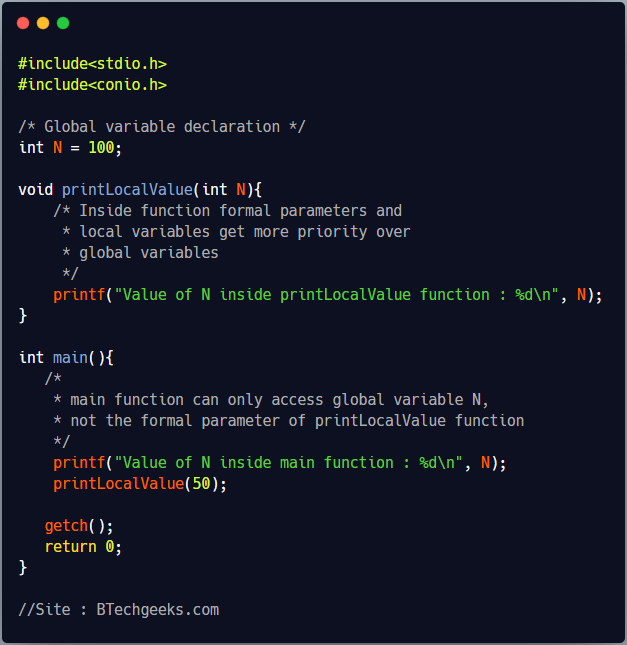The scope of a variable defined the sections of a program from where a variable can be accessed. The scope of variable depends upon it’s place of declaration.
There are three places where a variable can be declared in a C program:
- Outside of all functions(including main). This type of variables are known as global variables.
- Inside a function or inside a block of code. This type of variables are known as local variables.
- Declared as the formal parameter in a function definition. This is similar to a local variable in scope of function’s body.
Local Variables in C
Local variables in C are declared inside a function body or block of code(inside {} braces).
- Local variables can only be accessed by other statements or expressions in same scope.
- Local variables are not known outside of their function of declaration or block of code.
- Local variables gets created every time control enters a function or a block of code. When control returns from function or block of code, all local variables defined within that scope gets destroyed.
- By default, local variables contains garbage values unless we initialize it.
C Program to show use of Local Variables

#include<stdio.h>
#include<conio.h>
float getAreaOfRectangle(float length, float width){
/* local variable declaration */
float area;
/* area variable is only visible
inside getAreaOfSquare function */
area = length*width;
return area;
}
int main(){
/*length and width are local
variables of main function */
float length, width;
printf("Enter length and width of rectangle\n");
scanf("%f %f", &length, &width);
printf("Area of rectangle = %f", getAreaOfRectangle(length, width));
getch();
return 0;
}
Output
Enter length and width of rectangle 4.0 8.0 Area of rectangle = 32.000000
In the above program, area is local variable of getAreaOfRectangle function, Hence it cannot be accessed outside of getAreaOfRectangle function. Similarly, length and width are local variables of main function.
Global Variables in C
Global variables in C are declared outside of a function, normally it is declared before main function and after header files.
- Global variables can be accessed form anywhere in a program. The scope of the global variables are global throughout the program.
- Any function can access and modify value of global variables.
- Global variables retains their value throughout the execution of entire program.
- By default, global variables are initialized by the system when you define. Global variables of data type int, float and double gets initialized by 0 and pointer variables gets initialized by NULL.
- We can use same name(identifiers) for local and global variables but inside a function value of local variable gets priority over global variable.
C Program to show use of Global Variables

#include<stdio.h>
#include<conio.h>
/* Global variable declaration */
int area;
int main(){
int side;
printf("Enter side of square\n");
scanf("%d", &side);
/*Global Variables can be accessed from any function */
printf("Area Before = %d\n", area);
area = side*side;
printf("Area After = %d", area);
getch();
return 0;
}
Output
Enter side of square 5 Area Before = 0 Area After = 25
In the above program, variable area is a global variable which is defined before main function. By default, area variable gets initialized by 0.
Formal Parameters in C
Formal Parameters in C are the arguments which is used inside body of function definition. Formal parameters are treated as local variables with-in scope of that function. It gets created when control enters function and gets destroyed when control exits from function.
Any change in the formal parameters of the function have no effect on the value of actual argument. If the name of a formal parameter is same as some global variable formal parameter gets priority over global variable.
C Program to show use of Formal Parameters

#include<stdio.h>
#include<conio.h>
/* Global variable declaration */
int N = 100;
void printLocalValue(int N){
/* Inside function formal parameters and
* local variables get more priority over
* global variables
*/
printf("Value of N inside printLocalValue function : %d\n", N);
}
int main(){
/*
* main function can only access global variable N,
* not the formal parameter of printLocalValue function
*/
printf("Value of N inside main function : %d\n", N);
printLocalValue(50);
getch();
return 0;
}
Output
Value of N inside main function : 100 Value of N inside printLocalValue function : 50
In the above program, the formal parameter N defined inside printLocalValue function takes more priority than global variable of same name.
